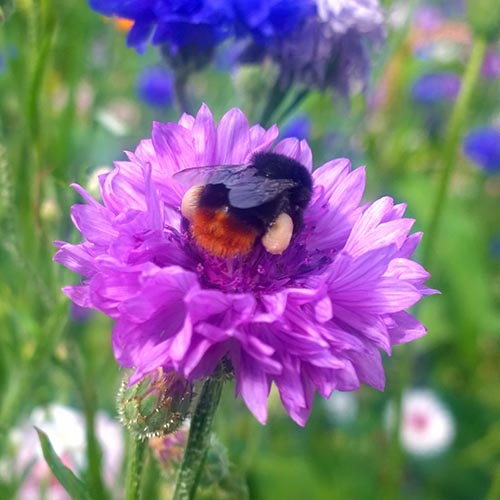Blooms for Bees is a citizen science project to promote and improve gardening for bumblebees.
Bumblebees are popular and important pollinators. There are currently 25 species of bumblebee in the UK. Unfortunately, UK bumblebee populations have declined in recent years, with two species becoming extinct since 1940. This is largely a result of the intensification of agricultural practices, which has reduced the availability of the flowers that bumblebees feed on.
Gardens and allotments offer an amazing opportunity to create vibrant flower rich habitats to support these vital pollinators. Despite this, little is known about which bumblebee species visit gardens and allotments, or which flowers are the most important sources of nectar and pollen.



Between 2017 and 2020, a total of 1,500 participants conducted over 2,800 flower surveys and submitted their data to the Blooms for Bees project.
A total of 5,263 bumblebees were reported, and we were able to confirm that 15 of the UK’s 25 bumblebee species were visiting gardens and allotments. This included the seven most common species, as well as the scarce Ruderal Bumblebee, Moss Carder Bee, Heath Bumblebee and Bilberry Bumblebee.
A range of flowering plants were surveyed, and Allium, Dahlia and Origanum all emerged as valuable for supporting a wide range of UK bumblebee species and would be good choices for containers and smaller gardens. We also found that Dahlia x hortensis Mignon Series was as a good alternative to annual bedding plants.
We are currently working on funding applications to further develop the project and enable updates to improve the Blooms for Bees app.
Our published journal papers provide further details about our results and findings:
Full citation: Falk S, Foster G, Comont R, Conroy J, Bostock H, Salisbury A, Kilbey D, Bennett J & Smith, B. (2019) Evaluating the ability of citizen scientists to identify bumblebee (Bombus) species. PLoS ONE 14(6): e0218614. https://doi.org/10.1371/journal.pone.0218614
Partners


The Centre for Agroecology, Water and Resilience (CAWR) at Coventry University is leading innovative, trans-disciplinary research to improve the understanding and development of resilient food and water systems internationally.

The Royal Horticultural Society (RHS) is the World’s largest gardening charity. The RHS are involved in many activities that promote and benefit gardening for its members and the wider public. Find out more about their Perfect for Pollinators scheme.

The Bumblebee Conservation Trust works to conserve bumblebees, and raise awareness about the social, economic, environmental and cultural benefits which they and other pollinators provide.

Garden Organic brings together thousands of people who share a common belief that organic growing is essential for a healthy and sustainable world. Through campaigning, advice, community work and research, their aim is to get everyone growing ‘the organic way’.

Hozelock is one of Britain’s favourite gardening suppliers, with over half a century of horticultural expertise. Hozelock’s products combine knowledge, passion and pride in craftsmanship to develop gardening solutions that help gardens flourish. Designed by gardeners, for gardeners.
Funders
Blooms for Bees is funded by the Heritage Lottery Fund, Coventry University and Hozelock.




